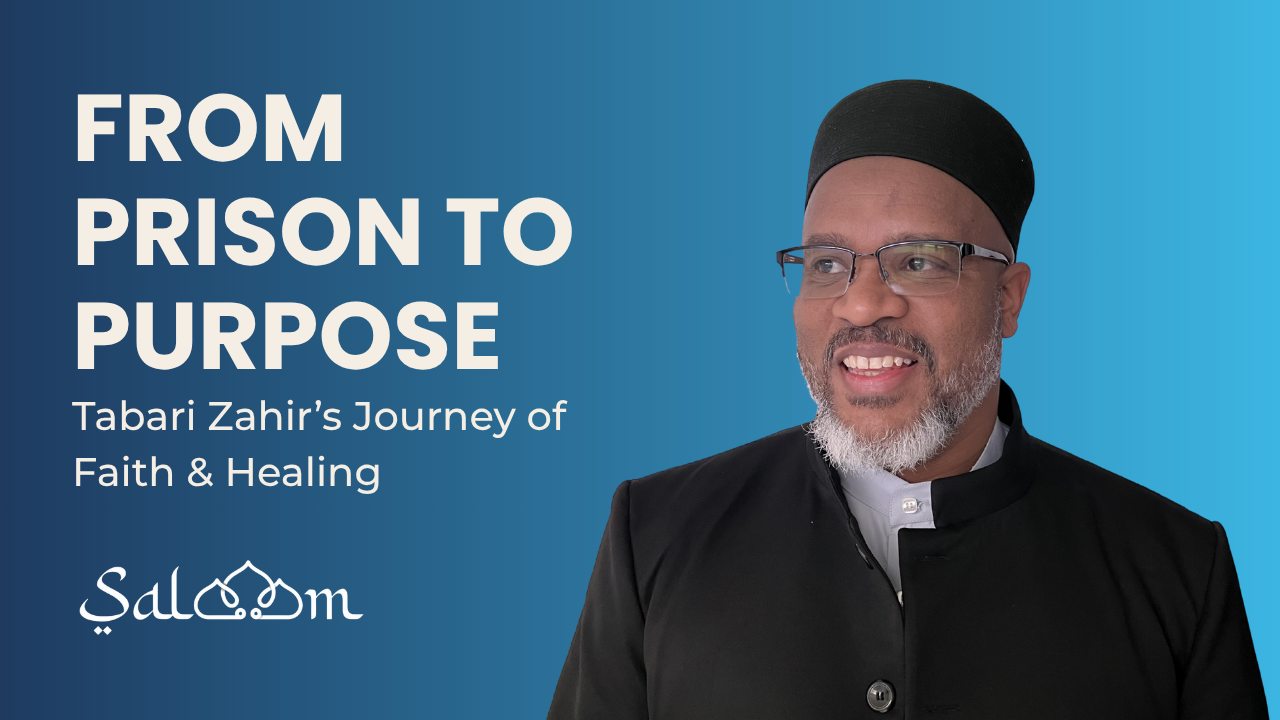
In a world where stress, mental health struggles, and spiritual disconnection seem to grow more intense by the day, understanding the link between physical health and spiritual wellness is more crucial than ever. For Muslims living in the West, finding this harmony is often a delicate journey, balancing modern-day challenges with timeless Islamic wisdom. No one understands this connection better than Tabari Zahir—a dedicated therapist, Muslim chaplain, and former inmate whose profound life experiences now shape his transformative work in mental and spiritual health.
Tabari Zahir was born and raised in America, where he first encountered Islam through his family, who embraced Islam in the early 70s. Despite studying under respected scholars from Pakistan, Mauritania, Syria, Morocco, and Egypt, it was an unexpected trial that truly ignited his spiritual awakening: his incarceration for a non-violent drug-related crime.
Q: What was the turning point during your incarceration that made you fully commit to your spiritual transformation?
“I knew two things. I knew number one, that I had to do something to attract the mercy of Allah, because I was looking at 20 years in prison… So I started teaching… Then it slowly began to dawn on me what I had to do. I was in prayer, and I said Allahu Akbar. My mind and my heart began to consider that the things I had done had offended Allah subhanahu wa ta’ala… The feeling was so overpowering, I couldn’t even finish my prayer. I just dropped into sujood and asked Allah to forgive and guide me”.
This profound moment of realization marked a transformative repentance—a tawbah that wasn’t just about seeking forgiveness for specific acts but reevaluating his entire life in the pursuit of spiritual purity.
Tabari emphasizes the importance of guidance from mentors, especially Sheikh Rami Nsour, who played a vital role during his prison years. Sheikh Rami introduced him to the Mauritanian system of learning through memorization, shaping Tabari’s Islamic education and his approach to teaching others.
Q: How did your teacher influence your spiritual growth in prison?
“Sheikh Rami encouraged us to memorize texts the same way as in Mauritania… it allowed me to deepen my understanding of the Deen. Now you’re part of a system, part of an Isnad, an understanding that has produced some of the greatest ulema in the world. That was the biggest help”.
This structured mentorship provided Tabari with not just academic knowledge, but also emotional and spiritual clarity that guided him toward authentic transformation.
When Tabari left prison after 11 years, adjusting to freedom presented new challenges. Reconnecting emotionally with his children was the most difficult personal transition:
“I didn’t know how to connect with my children emotionally… I was still stuck in prison mode—always on guard, correcting everything. My son once asked me why I was walking around as if I was ready to fight. That moment was eye-opening”.
Spiritually, transitioning from self-directed worship and study in prison to active service in the community was equally challenging:
“In prison, the work is self-directed—memorizing, teaching, practicing. But when you’re out, your priorities shift to helping others… your awrad becomes serving the creation of Allah after you’ve helped yourself. I had to realize there were so many people needing practical guidance”.
Tabari now balances many roles—as therapist, chaplain at UCLA, founder of the Lamps of Light Project specializing in addiction treatment, and a sought-after speaker. Surprisingly, he has never experienced burnout due to the careful management of his spiritual and physical well-being:
“You become like a compressed spring when you have good intentions and Allah is supporting you… I had 10 years of suppressed ambition. When I got out, it all came to life… Yet, there are moments when I feel overwhelmed. When that happens, you must honor your body’s rights. Like Salman al-Farsi advised Abu Darda, ‘Allah has his rights, your wife has her rights, and your body has its rights’”.
Above all, Tabari emphasizes the necessity of spiritual purification (tazkiyah):
Q: What’s one lesson from your experience every Muslim should know?
“You must engage in some form of spiritual purification (muhasabah). Everyone must look deeply at themselves, acknowledge weaknesses, and actively work on purifying their hearts. Today’s world is full of spiritual distractions and destructions; just performing the five daily prayers isn’t enough. You need a spiritual regimen”.
For Tabari, purification involves a deliberate effort to refine one’s soul through consistent worship, daily recitation of the Quran, regular dhikr (remembrance of Allah), and sending salawat upon the Prophet Muhammad ﷺ.
Tabari’s motivation and perseverance, even during overwhelming times, come from consistently returning to his pure intentions:
“When I get overwhelmed, I return to my intention. I make dua daily: ‘Oh Allah, help me purify and rectify my intentions for Your noble sake.’ Allah provides insights and assistance you know didn’t come from yourself—true divine aid”.
His life exemplifies how the right intention, combined with reliance on Allah, can transform challenges into opportunities for spiritual growth and service.
Tabari’s life journey is a powerful testament to the connection between physical trials, mental resilience, and spiritual awakening. His experiences highlight the beauty and necessity of continuous spiritual purification, guided mentorship, and balancing personal well-being with community service. For Muslims navigating the complexities of Western life, his story serves as an inspiring reminder that true wellness is holistic—it requires nurturing our minds, bodies, and souls simultaneously.
As we reflect on Tabari’s journey, let’s ask ourselves: How can we better integrate our spiritual beliefs into our daily lives to find balance, peace, and true transformation? Let’s use his story as a stepping stone toward embracing the fullness of our own spiritual potential.
May we all be guided toward wholeness, in this life and the hereafter. Remember to keep Tabari—and yourself—in your du’as.